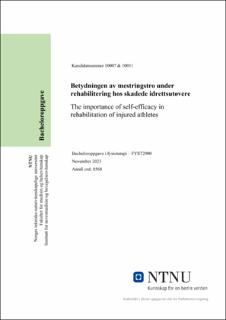| dc.contributor.advisor | Unsgaard-Tøndel, Monica | |
| dc.contributor.author | Holten, Vilde Indseth | |
| dc.contributor.author | Fredheim, Nina Emilie Olaisen | |
| dc.date.accessioned | 2024-01-11T18:19:47Z | |
| dc.date.available | 2024-01-11T18:19:47Z | |
| dc.date.issued | 2023 | |
| dc.identifier | no.ntnu:inspera:177551117:177554616 | |
| dc.identifier.uri | https://hdl.handle.net/11250/3111211 | |
| dc.description.abstract | Sammendrag
Bakgrunn: Hos mange skadede utøvere er det ultimate målet å returnere til idretten på en trygg måte, men ved skader følger gjerne flere ulike negative psykologiske aspekter hos utøveren. Det er lett å tenke at skader i hovedsak påvirker fysiologiske vev og strukturer. Likevel viser forskning at utøverens mentale helse påvirkes vel så mye som den fysiske. Fysioterapeuter har en mulighet til å bidra og styrke psykologiske aspekter hos utøvere gjennom en biopsykososial tilnærming. Denne litteraturstudien ser derfor på betydningen av mestringstro i rehabilitering og returnering til idrett i et helsefremmende perspektiv.
Hensikt: Undersøke betydningen av mestringstro under rehabilitering hos skadede idrettsutøvere.
Metode: Oppgaven er en litteraturstudie som benytter kvalitative og kvantitative studier for å besvare problemstillingen. Aktuelle søk ble gjort i databasene Web of Science, SPORTDiscus og PubMed. Åtte studier ble inkludert i litteraturstudien.
Resultat: Mestringstro under rehabilitering hos skadede utøvere kan bidra til mindre frykt for (re)skade og det er en sammenheng mellom økt grad av mestringstro og økt sannsynlighet for returnering til preoperativt idrettsnivå etter rehabiliteringen. Utøvere med høy grad av mestringstro oppga i studiene et nytt perspektiv og positivitet hva gjelder skadesituasjonen, økt evne til å oppsøke hjelp og støtte, økt selvtillit og motivasjon, og evnen til å lære av vanskelige situasjoner. Personlighetstrekk som resiliens og stamina henger tett sammen med, og drives frem, av mestringstro. Økt grad av mestringstro assosieres også med økt grad av funksjon, compliance og adherence i rehabiliteringen, mens lav grad av mestringstro blir forbundet med økt psykologisk stress som følge av en idrettsskade.
Konklusjon: Betydningen av mestringstro i rehabilitering hos skadede utøvere viser seg å være stor, både når det gjelder returnering til idretten og i et helsefremmende perspektiv. Resultatene i denne litteraturstudien indikerer at en biopsykososial tilnærming og større fokus på psykologiske faktorer vil være viktig i fysioterapeuters møte med skadede utøvere.
Nøkkelord: mestringstro, rehabilitering, utøvere, skade, salutogenese, biopsykososial modell | |
| dc.description.abstract | Abstract
Background: For many injured athletes, the ultimate goal is to return to sport in a safe way, but injuries often result in different types of negative psychological aspects for the athlete. It is easy to think that injuries mainly affect physiological tissues and structures. Nevertheless, research shows that the athlete's mental health is affected as much as their physical health. Physiotherapists have the opportunity to contribute and strengthen psychological aspects in athletes through a biopsychosocial approach. Therefore, this literature study will look at the importance of the psychological factor self-efficacy in rehabilitation and return to sports in a health-promoting perspective.
Aim: Examine the importance of self-efficacy in rehabilitation of injured athletes.
Method: This assignment is a literature study that applies qualitative and quantitative studies to answer the thesis. Relevant searches were conducted in the databases Web of Science, SPORTDiscus and PubMed. Eight studies were included in this literature study.
Results: Self-efficacy during rehabilitation in injured athletes can contribute to less fear of (re)injury, and there is a correlation between higher self-efficacy and an increased probability of returning to pre-operative sport level after rehabilitation. In the studies, athletes with a high self-efficacy stated a new perspective and positivity regarding the injury, increased ability to seek help and support, increased self-confidence and motivation and the ability to learn from difficult situations. Personality traits such as resilience and stamina are closely related to, and driven by, self-efficacy. High self-efficacy is also associated with an increased function, compliance and adherence in rehabilitation, whilst low self-efficacy is associated with increased psychological stress as a result of a sport injury.
Conclusion: The importance of self-efficacy in rehabilitation of injured athletes is shown to
be high when it comes to returning to sport and in a health-promoting aspect. The results from this literature study suggest that a biopsychosocial approach and an increased focus on psychological factors will be important for physiotherapists when working with injured athletes.
Key words: self-efficacy, rehabilitation, athletes, injury, salutogenesis, biopsychosocial model | |
| dc.language | nob | |
| dc.publisher | NTNU | |
| dc.title | Betydningen av mestringstro under rehabilitering hos skadede idrettsutøvere | |
| dc.type | Bachelor thesis | |
